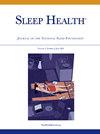Maternal-reported shorter total sleep duration but not consecutive sleep duration in infancy is associated with future sleep problems in preschoolers
IF 3.4
2区 医学
Q2 CLINICAL NEUROLOGY
引用次数: 0
Abstract
Objectives
Poor sleep during childhood can affect multiple domains of functioning. However, the association between early infant sleep patterns and future sleep problems is not well-understood. This study aimed to assess whether maternal-reported total sleep duration (over 24 hours) and consecutive sleep duration in infancy are associated with later maternal reports of sleep problems in preschoolers.
Methods
This longitudinal study included a community sample of 294 mother-child dyads. Total sleep duration and consecutive sleep duration were measured by maternal reports using the Questionnaire about Sleep Habits at 6 months. Sleep problems were assessed by maternal reports using the Sleep Problems subscale of the Child Behaviour Checklist/1.5-5 at 48 and 60 months.
Results
Generalized Estimating Equations models revealed that maternal-reported infant shorter total sleep duration, but not consecutive sleep duration, was associated with more sleep problems in preschoolers (higher total Child Behaviour Checklist Sleep Problems subscale scores), adjusting for socioeconomic status, maternal depression, breastfeeding status, sleeping arrangements, time, and biological sex. More specifically, infant shorter total sleep duration was associated with more bedtime resistance, difficulty falling asleep, the presence of nightmares, and shorter sleep duration.
Conclusions
Shorter maternal-reported total sleep duration but not consecutive sleep duration at 6 months was a marker of future parental reports of sleep problems in preschoolers. The results suggest that total sleep duration over 24 hours and sufficient opportunity to sleep should be prioritized over striving for an infant to sleep through the night during early infancy.
母亲报告说,婴儿时期总睡眠时间较短,而不是连续睡眠时间较短,这与学龄前儿童未来的睡眠问题有关。
目的:儿童时期睡眠不足会影响多个功能领域。然而,婴儿早期睡眠模式与未来睡眠问题之间的关系尚不清楚。本研究旨在评估母亲报告的总睡眠时间(超过24小时)和婴儿时期连续睡眠时间是否与母亲后来报告的学龄前儿童睡眠问题有关。方法:本纵向研究纳入294对社区母子二人组样本。总睡眠时间和连续睡眠时间在6个月时由产妇报告使用睡眠习惯问卷进行测量。在48个月和60个月时,使用儿童行为检查表/1.5-5的睡眠问题子量表,通过母亲报告对睡眠问题进行评估。结果:广义估计方程模型显示,经社会经济地位、母亲抑郁、母乳喂养状况、睡眠安排、时间和生理性别调整后,母亲报告的婴儿总睡眠时间较短,而不是连续睡眠时间,与学龄前儿童更多的睡眠问题相关(儿童行为检查表睡眠问题子量表总分较高)。更具体地说,婴儿总睡眠时间较短与更多的就寝阻力、入睡困难、噩梦的出现和较短的睡眠时间有关。结论:母亲报告的总睡眠时间较短,但在6个月时没有连续睡眠时间,这是未来父母报告学龄前儿童睡眠问题的一个标志。结果表明,在婴儿早期,总睡眠时间超过24小时和充足的睡眠机会应该优先考虑,而不是努力让婴儿整夜入睡。
本文章由计算机程序翻译,如有差异,请以英文原文为准。
求助全文
约1分钟内获得全文
求助全文
来源期刊

Sleep Health
CLINICAL NEUROLOGY-
CiteScore
6.30
自引率
9.80%
发文量
114
审稿时长
54 days
期刊介绍:
Sleep Health Journal of the National Sleep Foundation is a multidisciplinary journal that explores sleep''s role in population health and elucidates the social science perspective on sleep and health. Aligned with the National Sleep Foundation''s global authoritative, evidence-based voice for sleep health, the journal serves as the foremost publication for manuscripts that advance the sleep health of all members of society.The scope of the journal extends across diverse sleep-related fields, including anthropology, education, health services research, human development, international health, law, mental health, nursing, nutrition, psychology, public health, public policy, fatigue management, transportation, social work, and sociology. The journal welcomes original research articles, review articles, brief reports, special articles, letters to the editor, editorials, and commentaries.
 求助内容:
求助内容: 应助结果提醒方式:
应助结果提醒方式:


